



Pork Checkoff Showcases Continuous Improvement Efforts
US - Sustainability is critical to pork producers, National Pork Board President Conley Nelson told reporters at World Pork Expo in Des Moines, adding that pork producers view sustainability as something larger than just the traditional environmental definitions."If you do what is right from a production standpoint, you also will improve the environment; and if you do what is right for the environment, you also will improve production," said Mr Nelson, a farmer from Algona, Iowa. "Doing the right thing has allowed our industry to reduce the amount of water we use to produce of a pound of pork. Doing the right thing has helped our industry reduce our carbon footprint. And doing the right thing has helped us become more sustainable through changes in the way we raise pigs."
Mr Nelson said he tells fellow farmers that to understand where we are as an industry, we first needed to take a look back. What the data showed was decades of continuous improvement. The new research validates what farmers have always believed: that the production improvements we've made in our industry have improved the environmental sustainability of today's modern pork farms.
The new Checkoff-funded study analyzed how the industry's gains in production efficiency over the last 50 years have affected pork's environmental impact. Everything affecting pork's footprint at the farm level was included in the model, including feed, water, energy, land and crop-nutrient resources needed to produce pork.
"This is exciting stuff for those who have an interest in how we care for our pigs today," Mr Nelson said. "In 1978, a sow in the US would produce 9.95 pigs per year. Today, through better care of our animals, improved diets, and better housing, a typical sow will produce 9.97 pigs per litter - an amazing increase since sows are typically able to have at least two litters per year. Caring for more animals, while using fewer resources, benefits farmers, consumers, and the environment."
Other notable data from the research includes:
- Water use has been reduced 41 per cent per pound of carcass weight
- Land use has been reduced 78 per cent per pound of carcass weight
- Carbon footprint has been reduced 35 per cent per pound carcass weight
"This research shows the progress we've made over the last 50 years, but it is our commitment to continuous improvement during the next 50 years that will be critical to feed a growing population," Mr Nelson said.
As an example of continuous improvement, Nelson reported that participation in the Pork Quality Assurance® Plus (PQA Plus®) program has reached record levels. As of 1 June, more than 16,654 sites representing 74.93 per cent of the US pig inventory have been independently assessed, and over 55,000 individual producers are participating in PQA Plus.
"While we are at record numbers for PQA Plus participation, as an industry we must remain committed to showing We Care by making sure every farm is obtaining PQA Plus site status," said Chris Novak, CEO for the National Pork Board. "We are in the process of updating the PQA Plus Program to better serve our customers and enhance the care that we provide our animals."
Mr Novak also unveiled a new Certified Swine Manager program that will be available in the fall. The program will promote the industry's ideal of continuous improvement and further the We CareSM ethical principles.
"It's not about the type of production facility, but about the care farmers give their animals," Mr Novak said. "The vast majority of pork farmers today understand and embrace our industry's ethical principles-but we know we are not perfect. A stronger PQA Plus program and the new Certified Swine Manager program are just two key elements in building on our legacy of continuous improvement."








